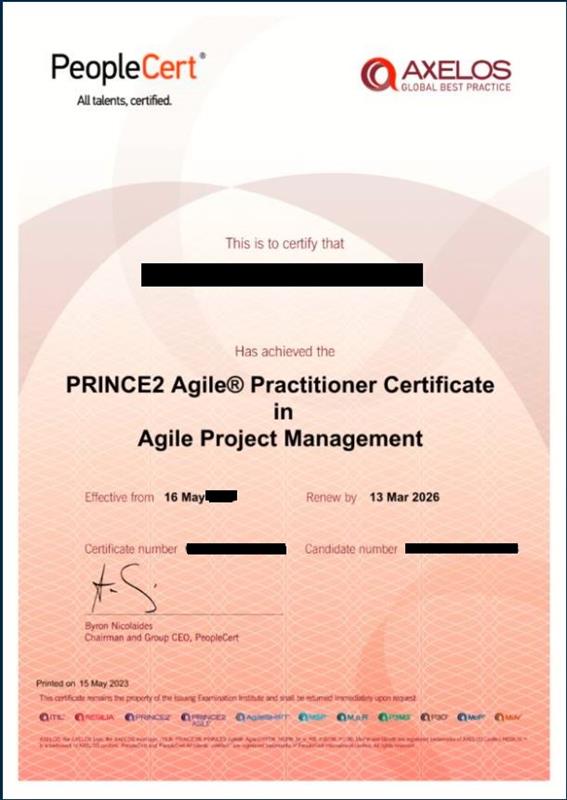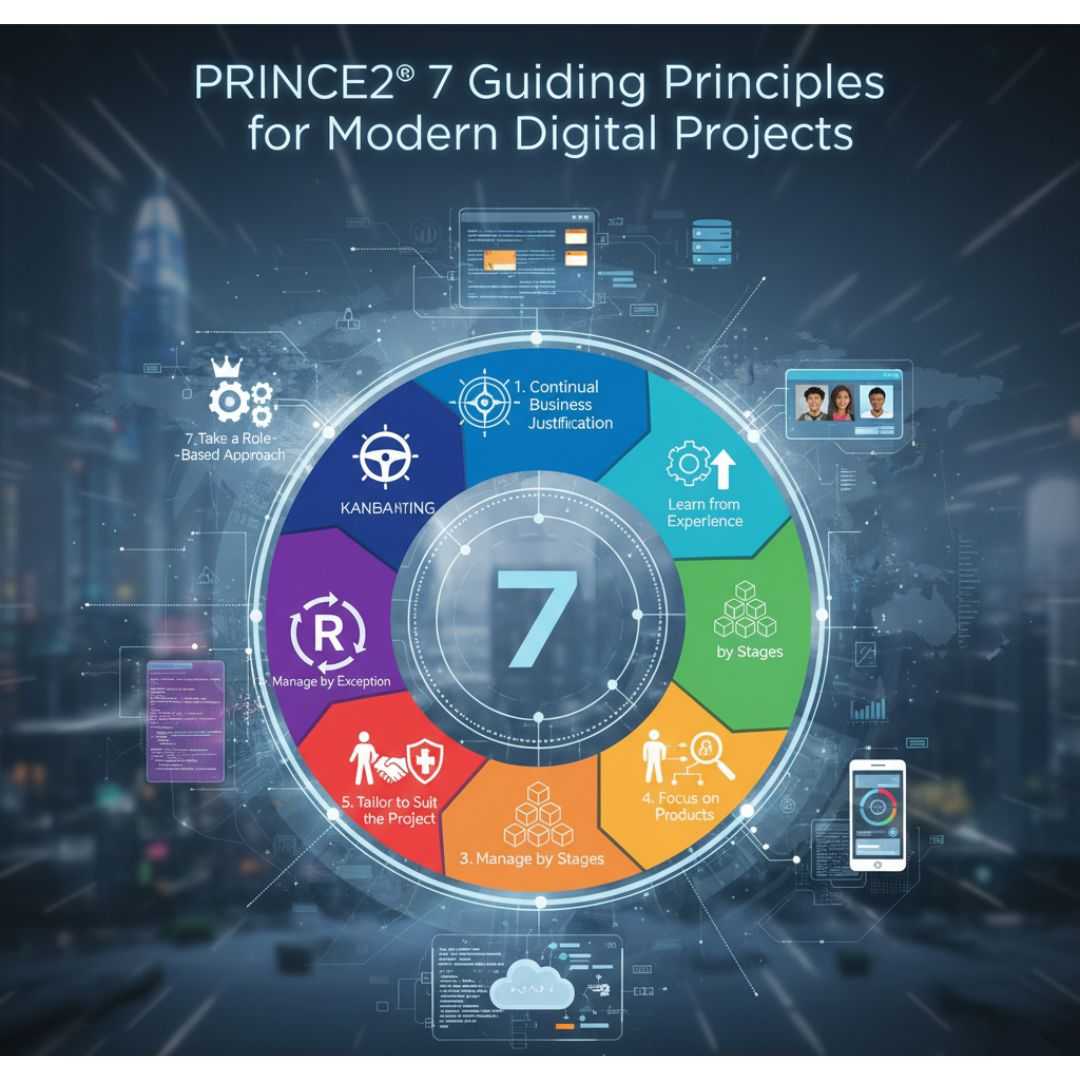PRINCE2 Agile Practitioner V2 Course Features & Benefits – Tailored for Fukuoka Professional
Why Fukuoka Learners Trust ScholarAcad for PRINCE2 Agile Practitioner V2 Exam Prep
1. Module: Explain the differences between projects and BAU (Business as usual)
Describe agile and its common approaches, how and why agile approaches have developed, and where they are used
Describe the history of agile, its contrast to the waterfall way of working, and how the Agile Manifesto fits in
Describe the different levels of agile maturity and well-known agile frameworks
Describe behaviors, concepts, and techniques that characterize agile
Define the PRINCE2 Agile view of 'agile
Describe Kanban, the Kanban method, and its six general practices, including the use of Cumulative Flow Diagrams (CFDs)
Describe the core concepts of Lean Start-up
Describe the use of workshops
Describe how to transition to agile
Define Scrum theory and explain the nature of the Scrum team, Scrum events, Scrum artifacts, and Sprints
2. Module: Describe the Complementary Strengths of PRINCE2 and the Agile Way of Working
Define who can benefit from using PRINCE2 Agile and in what contexts/situations
Define the makeup of PRINCE2 Agile (frameworks, behaviors, concepts, techniques, focus areas
Explain the eight' guidance points' Explain how PRINCE2 controls and governance can enable agile to be used in many environments
Describe what a typical PRINCE2' project journey' looks like in an agile context
3. Module: Explain the Purpose and Use of the Agilometer Throughout a Project
Describe the six sliders used on the Agilometer, explain their significance, and how to improve them
Describe in detail requirements terminology, decomposition, and prioritization, including Moscow and Ordering
Explain how requirements prioritization is used
Explain the rich communication focus area, its importance, and its key techniques
Explain how to manage frequent releases and the benefits of 'failing fast'
4. Module: Describe How to Use the 'Hexagon' about the Six Aspects of Project Performance
Explain the use of tolerances in terms of what to 'fix' and what to 'flex' about the six aspects of project performance
Describe in detail each of the five targets that underpin the use of the hexagon
Explain why the 'fix and flex' approach is good for the customer
5. Module: Describe in Detail the Five PRINCE2 Agile Behaviors (Transparency, Collaboration, Rich Communication, Self-Organization, Exploration)
Explain that agile needs to be incorporated in all seven PRINCE2 processes and all seven themes but that the amount appropriate to each will vary depending on the project context
Describe the two common organization roles of Scrum master and Product owner
Explain how to adjust roles, including the use of specialist roles and the options for team organization in a project
Define the makeup of a typical delivery team
Describe servant leadership, its use, and importance
Describe how to define working agreements
Describe quality setting techniques, including 'definition of done' and the use of acceptance criteria
Describe quality testing, quality checking, and management techniques
Describe approaches to planning and typical planning techniques
Describe approaches to risk and how agile concepts mitigate many typical risks
Describe how blending PRINCE2 with agile approaches controls, responds to, and minimizes the impact of change, including risk management and configuration management
Describe how empowered self-organizing teams handle change dynamically within set tolerances
Describe common feedback loops and their importance
Describe progress monitoring techniques, including use of 'work in progress' boards, burn charts, information radiators
Describe in detail agile techniques that may apply to each PRINCE2 process, including Cynefin
Describe how to flex the 'Direct a Project' stage and the benefits of collaborative working
Describe how to 'manage by exception' with emphasis on empowerment, quantity of deliverables, rich information flows, and value of deliverables
Explain why PRINCE2' stages' may not be required, including the use of timeboxes and Scrum of scrums
Describe typical output mechanisms when 'Controlling a Stage' and 'Managing a Stage Boundary'
Describe the use of retrospectives and how to make them effective
Describe approaches to managing product delivery, including Scrum and Kanban
Explain how to define work packages, product descriptions, quality criteria, and tolerances
Give guidance on behaviors, risk, and the frequency of releases
Explain how to manage stage boundaries and the similarities between a stage and a release
Explain how to assess the quantity, quality, and benefits of stage deliverables
Explain how to effectively close a project, including evaluation of the use of agile
Describe how to tailor PRINCE2 products, including work packages, highlight reports and checkpoint reports
Describe in detail agile techniques that may apply to each PRINCE2 theme, including requirements, defining value, and user stories
Describe guidance on the use of contracts
Describe PRINCE2 Agile delivery roles
Explain how to use the health check
Describe the fundamental values and principles of agile
Outline tips for the PRINCE2 Agile project manager
View More
PRINCE2 Agile Practitioner V2 Learner Profile Fukuoka

Eligibility Guidelines for PRINCE2 Agile Practitioner V2 Certification Fukuoka
No specific prerequisites: Anyone can take the PRINCE2 Agile Practitioner certification exam.
It is highly recommended to have the PRINCE2 Foundation certification before taking the PRINCE2 Agile Practitioner exam.
Enroll in a PRINCE2 Agile Practitioner training course to learn the PRINCE2 Agile methodology.
Exam: Take the PRINCE2 Agile Practitioner exam, which consists of 60 multiple-choice questions. A score of 55% or higher is required to pass.

PRINCE2 Agile Practitioner V2 Among Highest Paying Fukuoka





















Online and Team Based Training Packages PRINCE2 Agile Practitioner V2 Fukuoka
PRINCE2 Agile Practitioner V2 Training Course Delivery Option for Fukuoka
Mon
Tue
09:00 - 17:00 (JST)
- # 1IXLMF51B109
- English (Language)
- Exam Voucher + 3 Practice Test
Thu
Fri
09:00 - 17:00 (JST)
- # 1IXLMF530109
- English (Language)
- Exam Voucher + 3 Practice Test
Thu
Fri
09:00 - 17:00 (JST)
- # 1IXLMF555109
- English (Language)
- Exam Voucher + 3 Practice Test
21-Day Roadmap to PRINCE2 Agile Practitioner V2 Certification Exam Success: Fukuoka

Familiarize yourself with the exam structure, including the number of questions, time limit, and types of questions
Thoroughly understand the principles, processes, and techniques of PRINCE2 Agile?.
Read and understand the official PRINCE2 Agile? manual.
Solve as many practice exams as possible to test your knowledge and identify areas where you need improvement.
Connect with other PRINCE2 Agile? candidates to share knowledge, discuss topics, and stay motivated.
Develop a structured study plan that covers all the essential topics. Allocate sufficient time for each topic based on your understanding and exam requirements.
Practice relaxation techniques to manage exam-day stress.
Meet PRINCE2 Agile Practitioner V2 Certified Professionals in Fukuoka
Based in: Tokyo, Japan
Looking to develop your IT leadership skills with ITIL 4 and specialize in Digital and IT Strategy? Meet Kenji Tanaka, an accredited ITIL trainer based in Tokyo. Kenji is dedicated to providing comprehensive training in ITIL 4 and helping you lead in the digital era.
Professional Background:
Kenji has over 15 years of experience in IT management, strategy development, and digital transformation across various industries in Japan. He has a deep understanding of ITIL principles and their application in strategic decision-making.
Certifications & Strong Knowledge:
- ITIL® 4 Foundation
- ITIL® 4 Leader: Digital and IT Strategy
- SIAM™ Foundation
- Strong Knowledge: ITSM, Google Cloud
Teaching Philosophy:
Kenji believes in a strategic and practical approach, focusing on aligning IT with business goals and leveraging digital technologies. His teaching philosophy emphasizes:
- Understanding ITIL 4 Principles: Deeply exploring the guiding principles and dimensions of ITIL 4.
- Mastering Digital and IT Strategy: Providing insights into developing and implementing effective IT strategies in a digital world.
- SIAM Awareness: Understanding the role of Service Integration and Management in complex IT landscapes.
- Exam Success Focus: Providing comprehensive preparation for ITIL 4 Foundation and Leader exams.
Course Offerings:
Kenji offers a range of ITIL and SIAM training programs:
- ITIL® 4 Foundation Certification Courses (In-Person and Virtual).
- ITIL® 4 Leader: Digital and IT Strategy Certification Workshops.
- SIAM™ Foundation Certification Courses.
- Customized ITIL and SIAM Training for Organizations in Japan.
Why Choose Kenji?
- Local Expertise: Based in Tokyo, Kenji understands the Japanese IT landscape.
- Leadership Focus: Expertise in ITIL 4 Digital and IT Strategy.
- Strategic Thinker: Known for his ability to connect IT with business outcomes.
- Strong Cloud Knowledge: Understanding of Google Cloud platforms.
Location:
Kenji is based in Tokyo, Japan, and offers training across Japan and virtually.

Kenji Tanaka
Experience: 15 years
Based in: Tokyo, Japan
Looking to develop your IT leadership skills with ITIL 4 and specialize in Digital and IT Strategy? Meet Kenji Tanaka, an accredited ITIL trainer based in Tokyo. Kenji is dedicated to providing comprehensive training in ITIL 4 and helping you lead in the digital era.
Professional Background:
Kenji has over 15 years of experience in IT management, strategy development, and digital transformation across various industries in Japan. He has a deep understanding of ITIL principles and their application in strategic decision-making.
Certifications & Strong Knowledge:
- ITIL® 4 Foundation
- ITIL® 4 Leader: Digital and IT Strategy
- SIAM™ Foundation
- Strong Knowledge: ITSM, Google Cloud
Teaching Philosophy:
Kenji believes in a strategic and practical approach, focusing on aligning IT with business goals and leveraging digital technologies. His teaching philosophy emphasizes:
- Understanding ITIL 4 Principles: Deeply exploring the guiding principles and dimensions of ITIL 4.
- Mastering Digital and IT Strategy: Providing insights into developing and implementing effective IT strategies in a digital world.
- SIAM Awareness: Understanding the role of Service Integration and Management in complex IT landscapes.
- Exam Success Focus: Providing comprehensive preparation for ITIL 4 Foundation and Leader exams.
Course Offerings:
Kenji offers a range of ITIL and SIAM training programs:
- ITIL® 4 Foundation Certification Courses (In-Person and Virtual).
- ITIL® 4 Leader: Digital and IT Strategy Certification Workshops.
- SIAM™ Foundation Certification Courses.
- Customized ITIL and SIAM Training for Organizations in Japan.
Why Choose Kenji?
- Local Expertise: Based in Tokyo, Kenji understands the Japanese IT landscape.
- Leadership Focus: Expertise in ITIL 4 Digital and IT Strategy.
- Strategic Thinker: Known for his ability to connect IT with business outcomes.
- Strong Cloud Knowledge: Understanding of Google Cloud platforms.
Location:
Kenji is based in Tokyo, Japan, and offers training across Japan and virtually.

Kenji Tanaka
Experience: 15 years
Based in: Tokyo, Japan
Looking to gain expertise in both COBIT 5 and COBIT 2019 for comprehensive IT governance in Japan? Meet Takeshi Sato, a highly experienced and certified COBIT trainer based in Tokyo. Takeshi is dedicated to providing comprehensive training in both versions of the COBIT framework.
Professional Background:
Takeshi has over 16 years of experience in IT governance, risk management, and compliance within the Japanese business environment. He has a deep understanding of the evolution of the COBIT framework and its application in enhancing enterprise IT value.
Certifications & Strong Knowledge:
- COBIT® 5 Foundation
- COBIT® 5 Implementation
- COBIT® 2019 Foundation
- COBIT® 2019 Design and Implementation
- Strong Knowledge: IT Governance, Enterprise IT Management, IT Risk Management, Regulatory Compliance, IT Audit
Teaching Philosophy:
Takeshi believes in a structured and comparative approach to COBIT training, highlighting the key differences and similarities between COBIT 5 and COBIT 2019. His teaching philosophy emphasizes:
- Understanding Both COBIT Frameworks: Clearly explaining the principles, components, and evolution of COBIT 5 and COBIT 2019.
- Practical Application in the Japanese Context: Providing practical guidance on implementing both frameworks within the Japanese business and regulatory landscape.
- Choosing the Right COBIT Version: Helping organizations determine which version of COBIT best suits their needs.
- Exam Success Focus: Providing comprehensive preparation for COBIT 5 and COBIT 2019 exams.
Course Offerings:
Takeshi offers a range of COBIT training programs covering both versions:
- COBIT® 5 Foundation and Implementation Courses (In-Person and Virtual).
- COBIT® 2019 Foundation and Design & Implementation Workshops.
- Comparison Workshops: COBIT 5 vs. COBIT 2019.
- Customized COBIT Training for Organizations in Japan.
Why Choose Takeshi?
- Local Expertise: Based in Tokyo, Takeshi understands the Japanese IT and regulatory landscape.
- Dual COBIT Expertise: Proficient in both COBIT 5 and COBIT 2019.
- Comprehensive Understanding: Ability to provide insights into the evolution and application of the COBIT framework.
- Structured and Knowledgeable Instructor: Known for his clear and organized teaching style.
Location:
Takeshi is based in Tokyo, Japan, and offers training across Japan and virtually.

Takeshi Sato
Experience: 16 years
Excel Professionally with PRINCE2 Agile Practitioner V2 Certification Fukuoka

View More
Fukuoka PRINCE2 Agile Practitioner V2: Career Success Stories from ScholarAcad
The PMP in Fukuoka with Scholaracad was instrumental in demystifying earned value management and forecasting accuracy in IT, tourism, and logistics projects. The trainer's explanations were crystal clear, enriched with examples from Japan's gateway to Asia. Their focus on developing critical thinking for the exam's trickier scenarios was invaluable. Absolutely the best PMP training in Fukuoka!

Scholaracad's PMP in Fukuoka provided unparalleled insight into stakeholder analysis in diverse, often highly interconnected, environments and managing their interests. The trainer's expertise in simplifying nuanced PMI terminology was remarkable. The emphasis on hybrid project methodologies and their practical application truly prepared me for real-world challenges. An indispensable course for project professionals in Fukuoka!

I was initially daunted by communications management in fast-paced, multi-cultural teams and conflict resolution strategies, but Scholaracad's PMP in Fukuoka made these critical topics remarkably easy to grasp. The instructor's engaging approach and illustrative examples ensured I thoroughly understood the concepts. The seamless support from the Scholaracad team was also commendable. A top-tier PMP experience in Fukuoka!

Learning Objectives
General Frequently Asked Questions
View More
View More
View More
View More
View More
View More
Expert Articles on PRINCE2 Agile Practitioner
Read More...
Read More...
Read More...
Fukuoka: A Hub for Technology, Learning, and Careers
Fukuoka is a major city in Japan, known for its strong focus on technology, innovation, and economic diversification. It is leveraging its strategic location and strong educational institutions to attract startups and innovation hubs, particularly in areas like fintech, AI, and renewable energy.
Key Locations
- Fukuoka Tech Hub : A hub for startups and innovation focused on fintech, AI, and renewable energy.
- Kyushu University : A leading institution driving research in AI, cybersecurity, and sustainability.
Why These Skills Are in Demand
Fukuoka’s tech sector is driven by its focus on sustainability, fintech, and digital transformation. Key skills in Project Management, Service Delivery, Agile, DevOps, and SAFe Agile are essential.
- Project Management : Managing large-scale projects, such as smart city initiatives or renewable energy developments, requires methodologies like SAFe Agile to coordinate efforts across multiple teams.
- Service Delivery : Protecting critical systems in finance, government, and telecommunications is crucial. As Fukuoka expands its digital infrastructure, professionals skilled in ITIL ensure seamless service delivery.
- Agile : Enhancing collaboration between developers and operators accelerates software deployments. Tools like Jira and Confluence are widely adopted to support Agile workflows.
- DevOps : Leveraging tools like GitLab and Kubernetes to streamline development and operations processes is crucial for maintaining high productivity and efficiency.
- SAFe Agile : Scaling Agile practices across larger organizations, especially in fintech and advanced manufacturing sectors, is vital. Fukuoka’s focus on innovation and sustainability makes SAFe Agile frameworks highly relevant.
Need More Information ?
Have more questions or need personalized guidance ?

Top Companies in Fukuoka Hiring PRINCE2 Agile Practitioner Professionals in 2025
| Company Name | Role | Job Description | Job Link |
|---|---|---|---|
| SoftBank | Telecom Project Manager | Lead telecommunications projects at SoftBank in Fukuoka, using PRINCE2 Agile to combine agile flexibility with structured governance. You will manage project lifecycles, coordinate cross-functional teams, and ensure alignment with SoftBank’s innovation goals. PRINCE2 Agile Practitioner certification and 3+ years of telecom project experience are required, with fluency in Japanese and English. The role involves facilitating Scrum and Kanban, managing risks, and delivering high-quality solutions. You will drive technological advancements in Fukuoka’s tech hub, leveraging agile tools for efficiency. Strong leadership and adaptability are key. | Job Link |
| Kyushu University | Academic Project Manager | Manage research and development projects at Kyushu University, utilizing PRINCE2 Agile to balance structured governance with agile delivery. You will oversee project planning, funding, and team coordination, ensuring timely research outputs. PRINCE2 Agile Practitioner certification and 3+ years of academic project experience are required, with fluency in Japanese and English. The role involves facilitating agile workflows, managing stakeholder relationships, and ensuring quality deliverables in Fukuoka’s academic hub. Analytical and communication skills are critical for success. | Job Link |
| TOTO Ltd. | Product Innovation Manager | Lead product innovation projects at TOTO in Fukuoka, applying PRINCE2 Agile to integrate agile practices with structured project controls. You will manage cross-functional teams, oversee product design and delivery, and ensure alignment with TOTO’s quality standards. PRINCE2 Agile Practitioner certification and 4+ years of product management experience are required, with proficiency in Japanese. The role involves facilitating agile ceremonies, managing risks, and driving innovation in sanitaryware solutions. Leadership and technical expertise are essential in this competitive market. | Job Link |
| Fukuoka City Government | Urban Development Project Manager | Oversee urban development projects for Fukuoka City, using PRINCE2 Agile to ensure flexible and controlled delivery. You will manage project timelines, budgets, and stakeholder engagement, ensuring alignment with city planning goals. PRINCE2 Agile Practitioner certification and 3+ years of public sector experience are required, with fluency in Japanese. The role involves facilitating agile workflows, coordinating with agencies, and ensuring sustainable urban solutions. Strong organizational and communication skills are vital for impactful projects. | Job Link |
| Nishi-Nippon Railroad | Infrastructure Project Manager | Manage infrastructure projects for Nishi-Nippon Railroad in Fukuoka, leveraging PRINCE2 Agile to balance agility and governance. You will oversee project planning, risk management, and team coordination, ensuring timely delivery of transport solutions. PRINCE2 Agile Practitioner certification and 3+ years of infrastructure project experience are required, with fluency in Japanese. The role involves facilitating agile practices, managing stakeholders, and ensuring quality deliverables. Leadership and adaptability are key in this dynamic sector. | Job Link |






